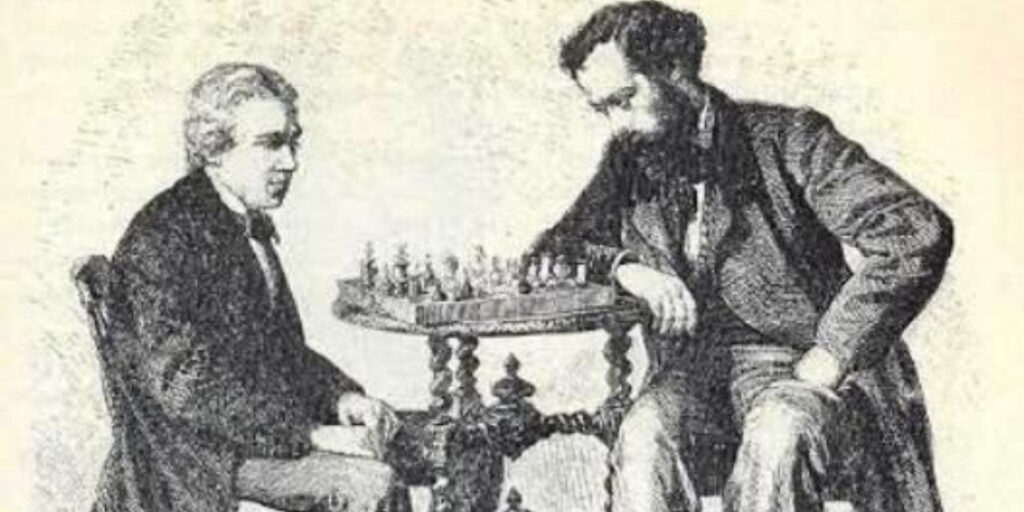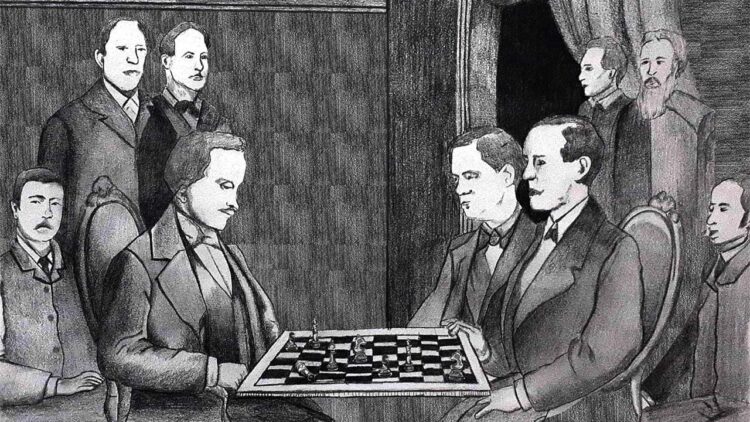The Opera Game, also known as the “Night At The Opera”, is a one of the most famous games in the history of Chess. Played in 1858, the game features American chess prodigy Paul Morphy against the Duke of Brunswick and Count Isouard, two Italian aristocrats.
Last Updated:
The game took place in the Italian Opera House in Paris and was a brilliant display of Morphy’s tactical prowess, showcasing his exceptional understanding of chess principles and ability to create breathtaking combinations. Below is the PGN position of the game you can go through.
Background
Paul Morphy was an American chess player who quickly gained recognition for his exceptional skills. Born in 1837 in New Orleans, Louisiana, Morphy demonstrated an extraordinary aptitude for the game from a young age. By the time he was in his early twenties, he was already considered one of the best chess players in the world. In 1858, Morphy traveled to Europe to compete against the best players of the continent.
During his time in Paris, Morphy was invited to the Italian Opera House to watch a performance of Rossini’s “The Barber of Seville.” It was here that the famous Opera Game took place. Morphy was asked to play a consultation game against the Duke of Brunswick and Count Isouard, who were consulting together. Despite being a casual game, the Opera Game is renowned for its stunning display of Morphy’s tactical and strategic skills.
The Game
The game was a short, 17-move contest that has been lauded for its elegance and clarity. Morphy, playing with the white pieces, opened with 1.e4, to which his opponents responded with 1…e5. The game quickly transitioned into a Philidor Defense with 3…d6. Morphy launched a series of aggressive moves, starting with the Evans Gambit, to create rapid piece activity and open lines for his pieces. His opponents, unprepared for such an onslaught, found themselves on the back foot.
The Duke and Count missed a tactical opportunity on move 9, allowing Morphy to initiate a brilliant combination. Morphy sacrificed his knight on move 11 with 11.Nxb5, forcing the black king to move and exposing it to a series of checks. Morphy continued to apply pressure, sacrificing his queen on move 15 with 15.Qb8+ to draw the black king further into the open.
Paul Morphy vs Duke Karl and Count Isouard

The game concluded with a stunning checkmate on move 17. Morphy’s rook on d1, supported by his light-squared bishop, delivered the final blow, as the black king had no escape squares.
Why Is The Opera Game So Famous
Why is the Opera Game so famous. Yes it’s a game that one of the best Chess players of all time played, but what else is there that gives it so much notoriety and prestige? If you attend a Chess class in person and the topic of opening principles is taught.
One of the games that is sure to be analyzed is the Opera Game, because this game does an excellent job at demonstrating the importance of rapid development of your pieces. Not only this lesson, but multiples other concepts in Chess, such as the sacrifice, that every players should learn like the back of their hands.
Takeaway Lessons
Despite being less than 20 moves, there are many lessons to take away from this game. Here are 5 of them.
- Develop your chess pieces quickly
- Castling into safety
- The strategic outpost at d5
- Attacking a pinned piece
- The use of an open file
Significance
The Opera Game is considered a masterpiece of chess because of Morphy’s ability to apply basic chess principles in a brilliant and precise manner. It demonstrates the importance of rapid piece development, open lines for the pieces, and king safety. Morphy’s sacrifices and combinations are remarkable examples of tactical vision and creative play.
Moreover, the game is a testament to Morphy’s sportsmanship and respect for his opponents. Despite being vastly superior to the Duke of Brunswick and Count Isouard, Morphy maintained a courteous demeanor throughout the game.
Legacy
The Opera Game remains one of the most famous and instructive games in chess history. Its brilliance and elegance have inspired countless players to study and appreciate the beauty of the game. The Opera Game is a testament to Paul Morphy’s genius and serves as an enduring reminder of his impact on the world of chess.
I hope this article on the Opera Game of Paul Morphy informed you of everything you wanted to know about it.
Do you like games like this? If you did, you might be interested in looking at more of the most famous Chess games like the Immortal Game, the Evergreen Game.


